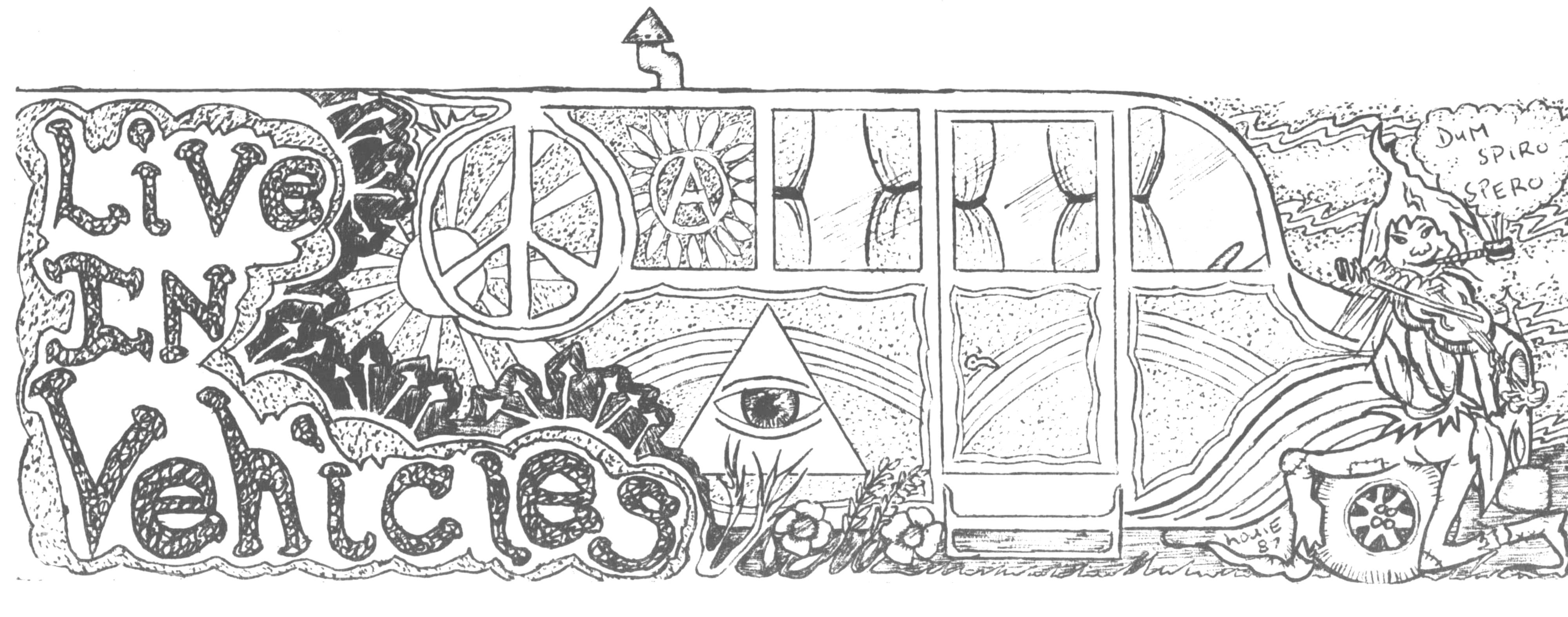Live in Vehicles

An important step for many green anarchists is the decision to pack up your bags and hit the road.
This decreases your involvement in the normal running of the mess-consumer society and life becomes a lot clearer and generally less hassled (spiritually).
Nomadic instincts have always been with us and should, if ever possible, not be ignored.
Ideally, you might be travelling bare-foot, minimum possessions living off resources growing wild.
OK in Tibet maybe, but here another option is required possibly involving a motorized live-in vehicle.
This vehicle would normally be a minimum liveable size equal to say a Ford Transit up to a large coach/double-decker.
A decision on the shape and size of the body is up to you. All vehicles of this size start life as a long oblong set on welded steel tubes. Below hang the wheels on their axles, attached to the chasis by the suspension (usually leaf springs).
Held within the front of the chassis is the engine, gearbox and clutch combination which drive the rear wheels via a propshaft running the length of the vehicle.
An early decision is whether your engine is to be petrol (fuel easy to obtain, easy starting) or diesel (economical, less to go wrong, but smelly). Bigger vehicles need bigger engines and bigger wallets. Large engines are often measured in cubic inches ranging from 200–600 c.i.
Bodies, made from wood and aluminium are good for living in with coaches or ’walkthrough’ (from the drivers cab) truck/lorries being the easiest to . convert from their working origins.
Vehicles made by Bedford are cheap and reliable as are Leyland (although often difficult to start). The bodies are often made by different companies such as Dennis, Plaxton or DuPel.
Old Post Office vehicles or ambulances, originally B.M.C. (British Motor Company) L.D.’ series of vans, are worth a look.
A non-steel bodied Chrysler/Commer walkthrough would be very good find.
Anything Ford is generally cheap but needs constant attention, but if received then they do what’s required.
Anything British is best due to spares availability. At least 1-foot ground clearence is necessary for uneven fields/kerbs.
Best place to buy your vehicle is from someone you know (perhaps already arrested) or from a private or hire coach/van company who will provide a good service history. Otherwise try scrapyards, auctions and classified ads but whatever buy one in running order and not the first one you see.
Steering, suspension, cooling and braking repairs are the most vital and most expensive as parts go. If you or a friend can’t fix it then learn quickly since professional labour costs are phenomenal.
If you are to become a long-term motorized traveller it will be essential to learn the trade. Buy the manuals and tools and ask lots of questions. But in the end you are going to get your hands dirty.
Quite apart from the daily essential maintenance, the working-type vehicle you buy will need extensive conversion to be a live-in type before you can set off. So you need somewhere to park for a while, which is always a big problem with lie-ins.
The important point when considering the conversion of the body (above the chassis) is that you simply have to live in it, just like any established home. So water, heat, light etc., are the priorities before putting the wallpaper up I Fitting window insulation and dividing the available space into co Departments are . considerations.
Don’t forget from the outside the less the vehicle looks lived-in, the less hassle from the authorities.
Day-to-day life on the road revolves around where to park up during the night to sleep/eat and your legal position is not simple and should be known. Expect.. hassle and be prepared. Having a legal vehicle helps (similar documentation to a car). A discrete sign declaring “Private-living van” gives you rights against random searches. Technically they then need a search warrant to get in. After all, it is your home.
It is possible to earn a wage on the road, but claiming your entitlement from the authorities is always is always a possible choice but will it pay for your running costs? Leaving your park-up site looking like a refuse tip, of course, helps nobody.
Don’t forget wherever you go acid rain will still fall on you. Living on the road should be a means to an end. • Your exhaust fumes aren’t going to solve anything.
Think and Breathe Free
Thanks to Steve P.
Further info: — Ideal Home, an excellent book. Try your local radical distributor or a couple of quid to:-
New Anarchist Review,
BM Bookserv.
London
WC1N 3YY.
